Personality radio is based on relatable people who share authentic stories in interesting and entertaining ways. But where to find talents, and how to coach and direct them?
Radio personalities and program directors seem like different species. One seeks freedom, one demands structure and hunts the other down – stick to the format! What’s the ideal balance? RADIO DAY 2012 in Germany invited 2 PDs, 1 personality and 1 talent coach to share their best practices on talent development & management for personality radio.
“I can fail at what I’m doing”
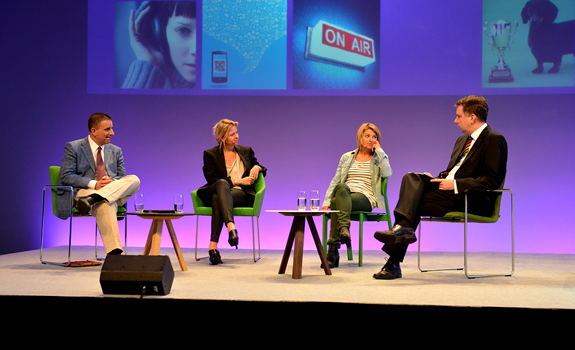
Sabine Heinrich (1LIVE, second from the right) values that the station gave her time to grow (photo: Thomas Giger)
Be prepared to change
Sabine Heinrich is a presenter on 1LIVE, the pop station of German public broadcaster WDR that currently reaches 1,1 million listeners an hour. She won the German Radio Award 2011 for her show 1LIVE mit Frau Heinrich (1LIVE with Mrs. Heinrich) between 10 AM and 2 PM. Contrary to popular belief about personalities that ad-lib everything, the presenter admits that she does write down all ideas for talk breaks beforehand. “It’s terrible gibberish and you couldn’t read what I’m writing. It’s my own code.” If she actually uses it, depends on the moment. She might spontaneously decide to drop whatever she’s prepared and do something else instead.
 Speak to individual listener(s)
Speak to individual listener(s)
Even if government-funded 1LIVE doesn’t have the ratings pressure of a privately-owned station, it does have a format. “My PD doesn’t say: just do whatever you want. But of course I know a thing or two about how it works”, Heinrich says. “I do have a vision of how each hour of the show should proceed, and a vision of who the audience is. I don’t see 1 million people; I see 6 people to which I’m talking and I know a bit of what they’re interested in.”
Let talents experiment & learn
“I often wonder whether I can be rehabilitated”, she answers to the question whether she would be able to function within a privately owned, tightly formatted station just as well. “Even in a narrow framework, I would want to find my way. I just couldn’t rigidly stick to the format.” Heinrich is happy to be on 1LIVE, as they give talents an opportunity to develop themselves – like allowing them to make mistakes without immediately pulling the plug after an occasional mistake. “I can fail at what I’m doing. I have the wonderful feeling that I work at a station that gave me time. Not everything went smoothly”, she recalls her first years at 1LIVE, where she started in 2001. “It can go up or down, but we don’t suddenly steer into another direction.”
“Yes, I am afraid…
that listeners might reject our program”
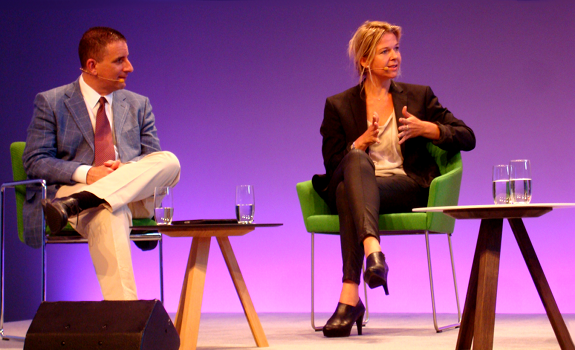
Valerie Weber (ANTENNE BAYERN, right) thinks twice before changing successful formats (photo: Thomas Giger)
Refresh your format enough
Valerie Weber is both General Manager and Program Director of ANTENNE BAYERN, Germany’s most successful private station with an average of 1.3 million listeners an hour. “I really enjoy to achieve great ratings. It’s my job, and I love this job. I love to be there for many listeners.” Then, very open: “Yes, I am afraid. I’m afraid that listeners might reject our program, or say that they don’t like our morning host. That would really give me a heartache.” On the other hand, she realizes that too conservative programming that is exclusively based on proven concepts is dangerous. Therefore, she says, you have to try something new every once in a while.
 Tell stories, not facts
Tell stories, not facts
Radio has to reflect the audience’s lifestyle, but it depends on how you do it. Valerie Weber notes that now ‘personality’ has become a popular topic in the German radio industry, “presenters suddenly tell that they have children, and mention the name of their spouse”. In het opinion, sharing personal details alone doesn’t make you a radio personality. It’s about being an interesting character with storytelling talent, and taking a position.
Deliver stories effective & efficient
Session host Martin Liss, who’s also PD of ENERGY Germany, suggests that program directors need to be careful not to stand in the way of real authenticity, especially as they’re focused on making sure that content fits the station’s philosophy. According to Weber, it’s not that extreme. But she does have some criteria for storytelling on her station, as she mentions that telling stories is about “touching people emotionally in the shortest amount of time possible”, and that it’s essential to “know beforehand how to start and how to end”. In other words, don’t elaborate unnecessary and have a point.
“Create characters that people care about”
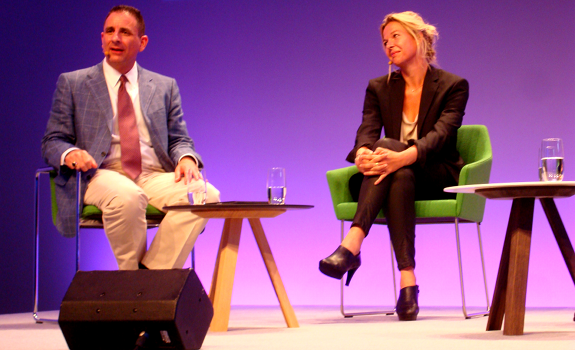
Steve Reynolds (left) explains that a good radio story is like a well-written movie script (photo: Thomas Giger)
Treat listeners like family
Talent coach Steve Reynolds of The Reynolds Group who has been a morning show host himself, advises clients to “look at the most important people in your personal life and think about the relation. Why is it important to you? Why did it stand the test of time? If you can be yourself around them; be real, vulnerable and authentic, and share whatever it is you wish to share – they care about you, and you care about them.” He points out that this creates loyalty, and makes people want to spend time with you: “The audience only buys a brand if they believe it to be authentic.” In his opinion, storytelling is a great way to achieve this, because stories are emotional and memorable. “Facts tell, stories sell.”
 Let your audience care
Let your audience care
Reynolds gives an example based on James Cameron’s movie Titanic that millions of people went to see, even if they all knew the ending. “What great screenwriters do, is create characters that people care about. I wanted the relationship between Jack and Rose to survive, even if I knew that it wouldn’t. For two-and-a-half hours I sat there, and got emotionally involved in their relation. I saw myself in them, thinking: that’s what I want for me!”
Be catchy, detailed & complete
Steve Reynolds explains that nearly all stories consist of 3 parts, in the following order:
- Hook: catches the attention
- Thesis: supports the hook by providing important details
- Roundup: ends the story (the punchline of a joke, the call to action, etc.)
Mojo in the Morning of Channel 95.5 in Detroit once confessed on the air that he’s bad in bed:
[audio:http://www.radioiloveit.com/wp-content/uploads/steve-reynolds-radio-talent-coach-radio-day-2012.mp3|titles=Steve Reynolds RADIO DAY 2012]
“Radio stations are absolutely worthless
without talent”
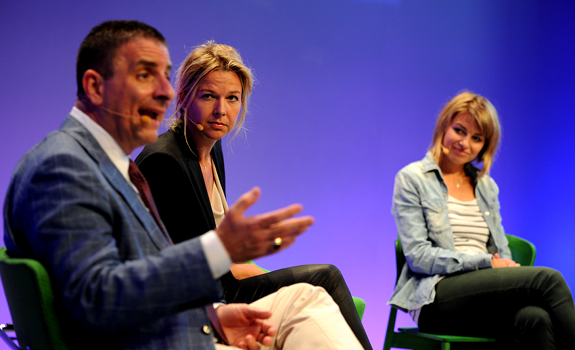
Steve Reynolds (left) says radio should invest in personalities; be different from Spotify & Co (photo: RADIO DAY)
Find personalities outside radio
Where do you find these unique personalities and interesting characters that you really want for your station? Steve Reynolds feels that in the radio industry, “we tend to look inside of our own”. Radio people often look for on air talents inside the studio building, even in the sales, marketing or promotion departments. Instead, program directors should go find new on-air talents outside the radio industry and approach interesting people in public places. “It’s easier to teach someone who has no skills how to do radio then it is to teach someone in radio, who might only be okay, how to have a personality.”
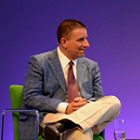 Develop talents over time
Develop talents over time
Reynolds advises that once you’ve found a potential candidate, don’t give him or her the morning show (or any slot) right away. Instead, create a feature for the talent, like a weekly morning show bit of just a few minutes. If the newbie handles it well, and the audience likes it, grow it from there. Developing talents gradually also protects you from spending too much coaching time (and station resources) upfront on possible cases of trial & error.
Value consistency, avoid immediacy
In a closing question, panelists get to answer the question: if you could make one wish for the future of authentic personality radio, what would it be? “Continue to invest in people”, Steve Reynolds pleads. “Radio stations are absolutely worthless without talent. Don’t get closer to Spotify – walk away from it.” ANTENNE BAYERN GM/PD Valerie Weber desires that everyone at the station is “taking positions”, from programmers to presenters. Last but not least, 1LIVE radio personality Sabine Heinrich hopes for “program directors who keep calm and don’t immediately change the course of the station when the numbers are incidentally not that good.”
Read also:
- Personality (related articles)
Stay tuned, follow us @RadioILOVEIT and click below to share this post:





Add Your Comment